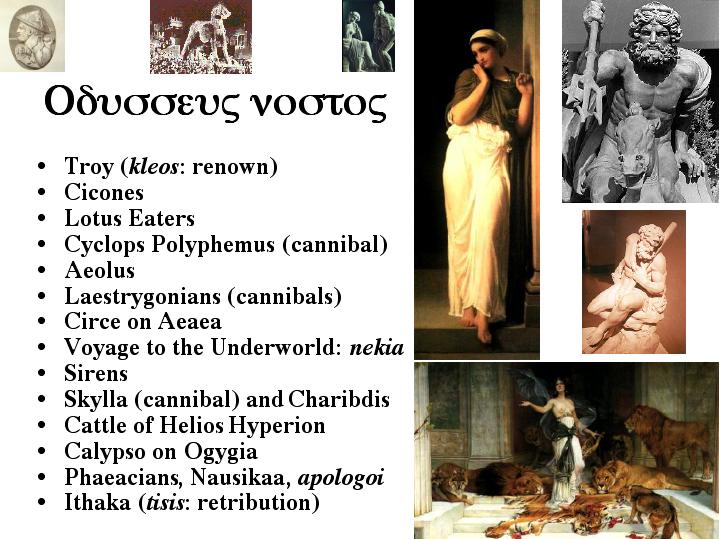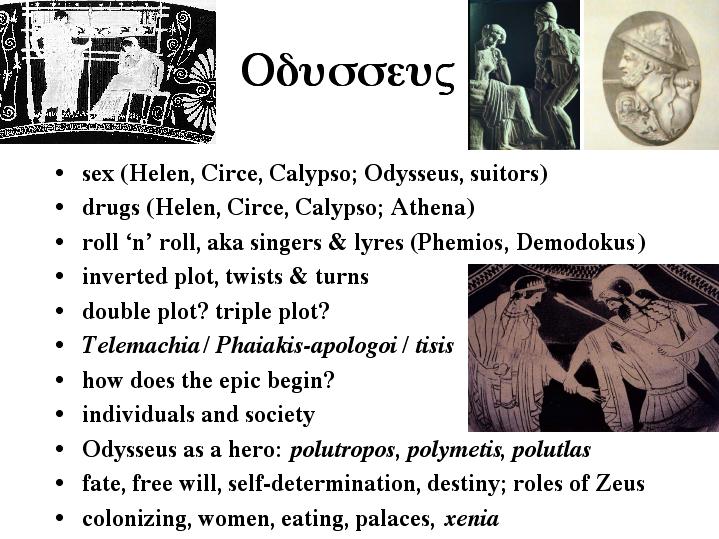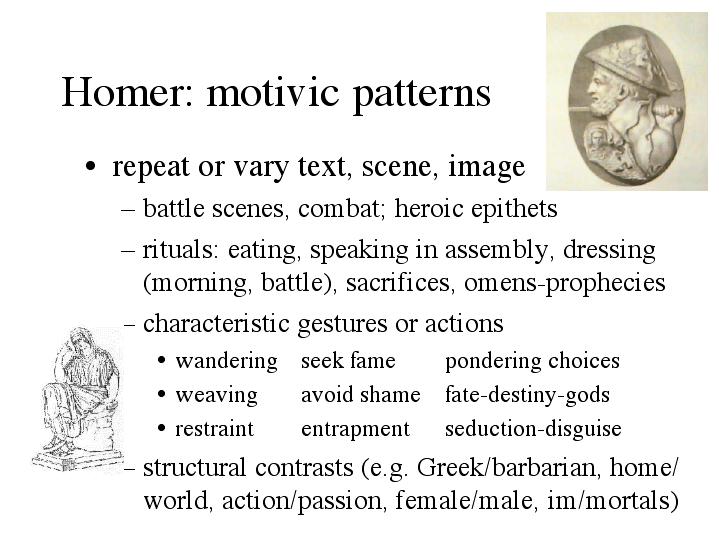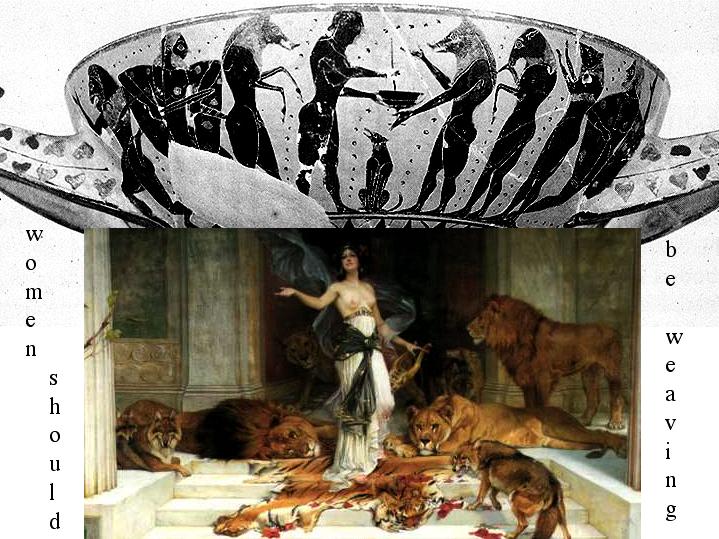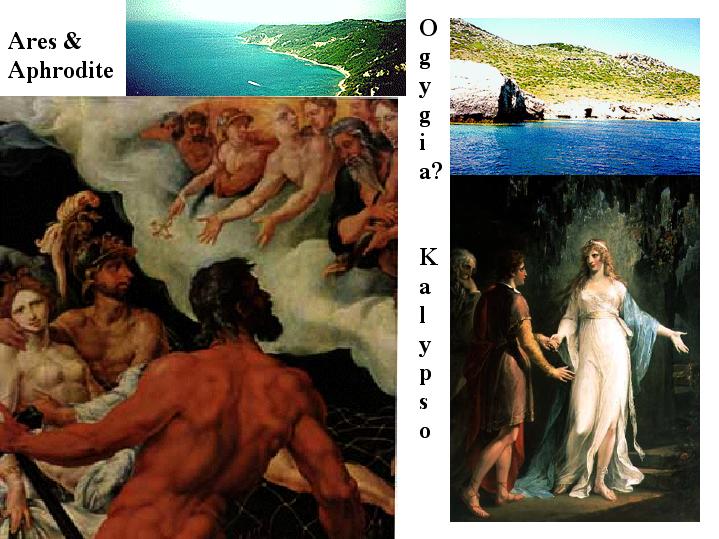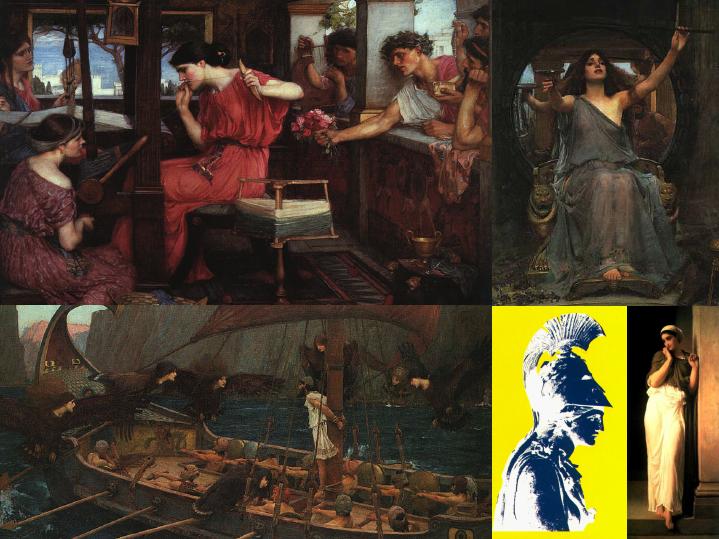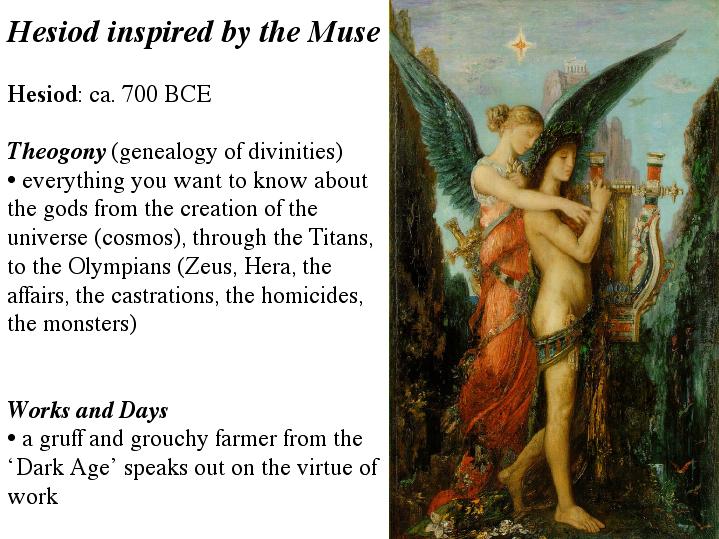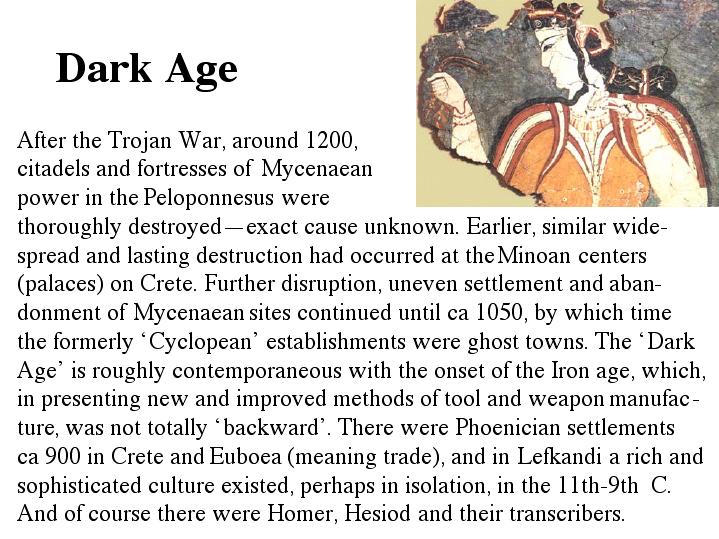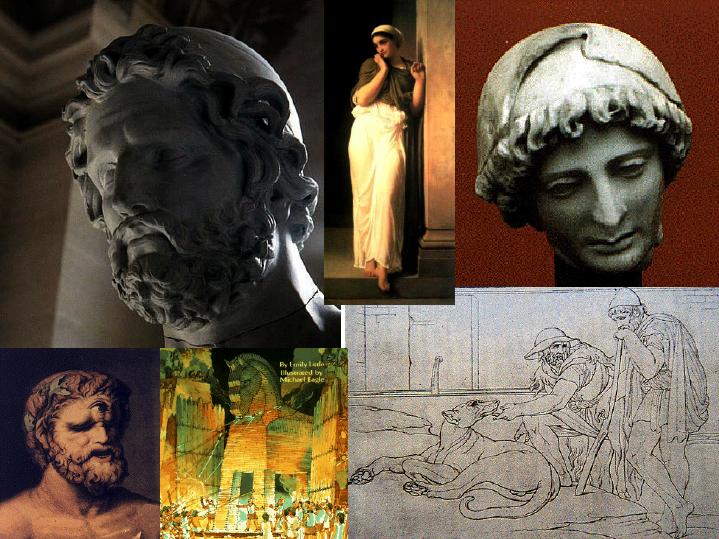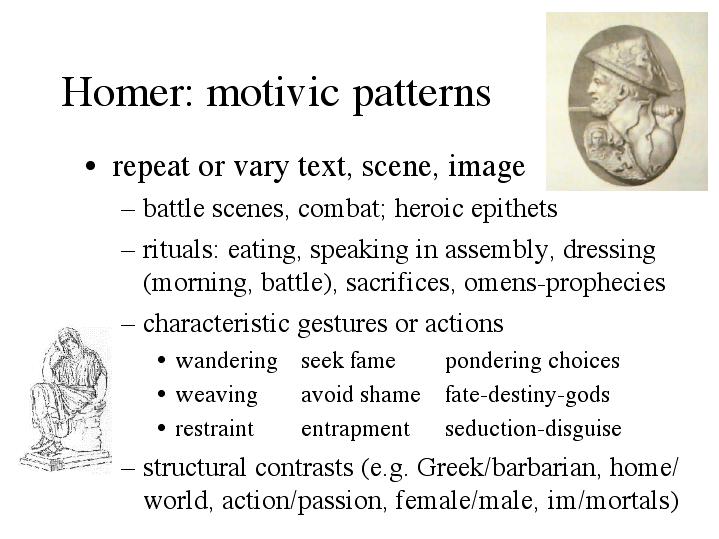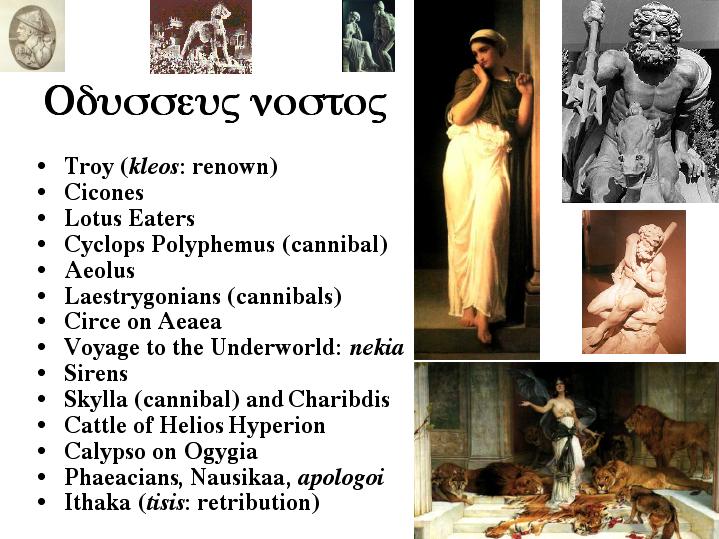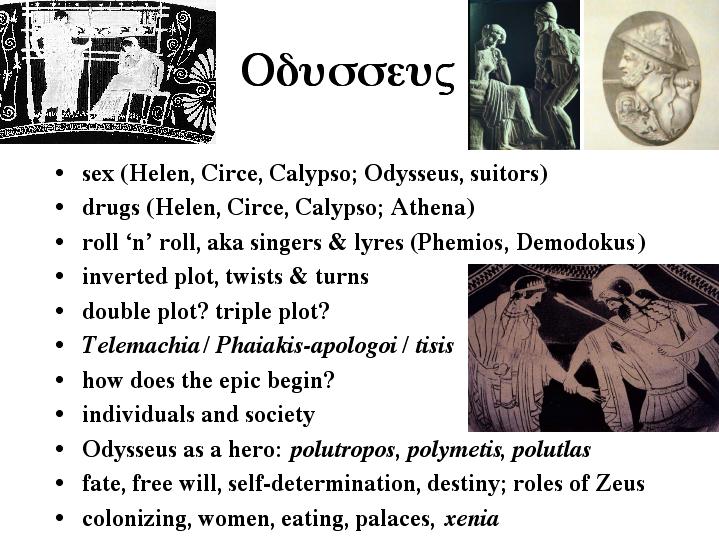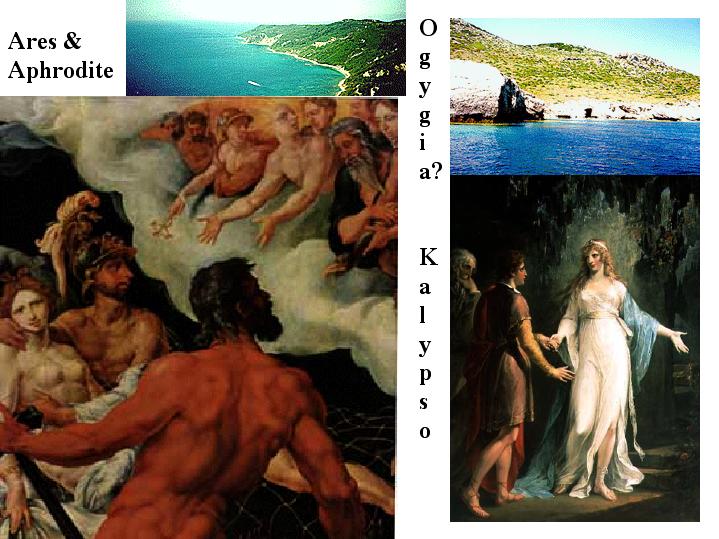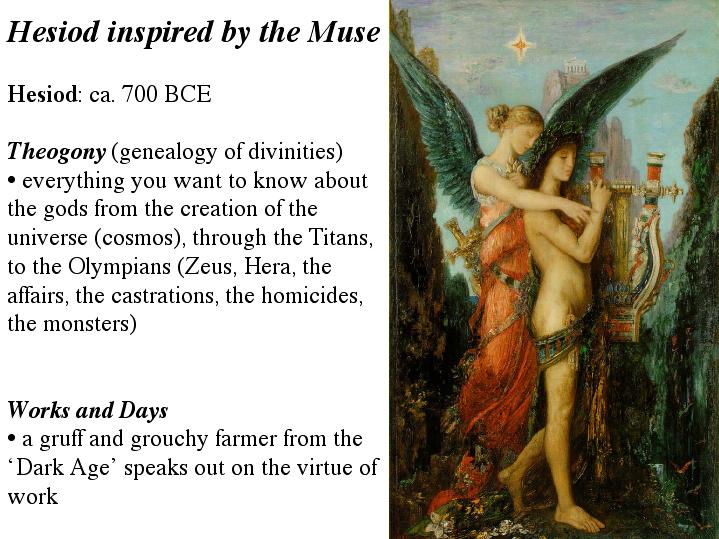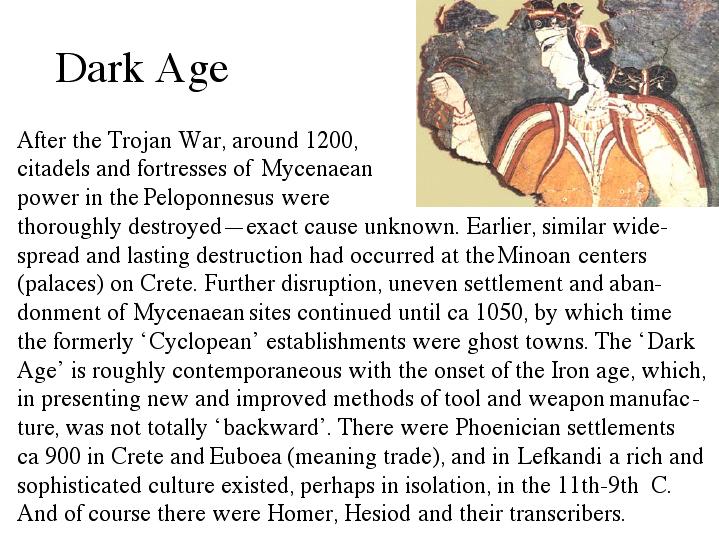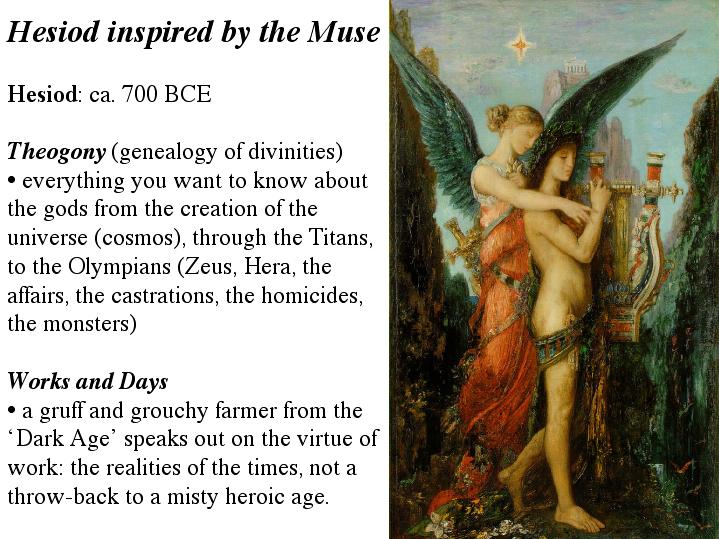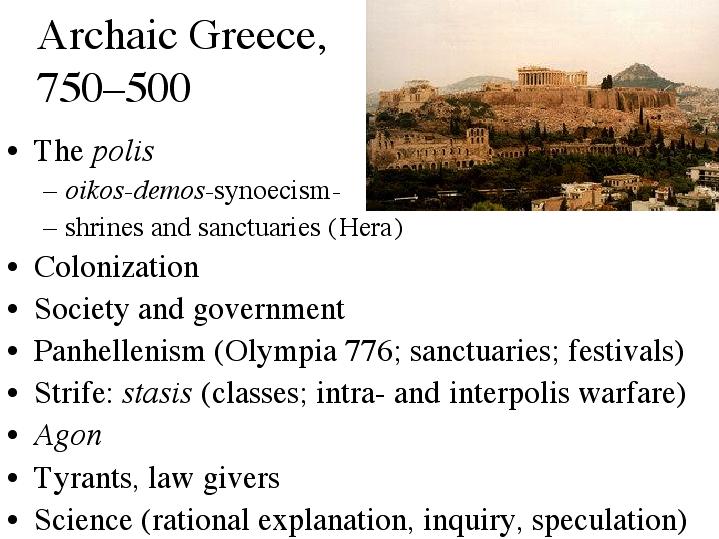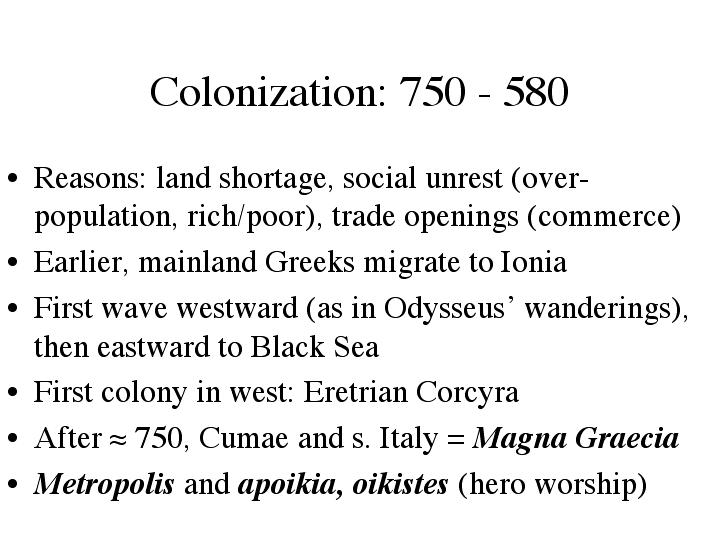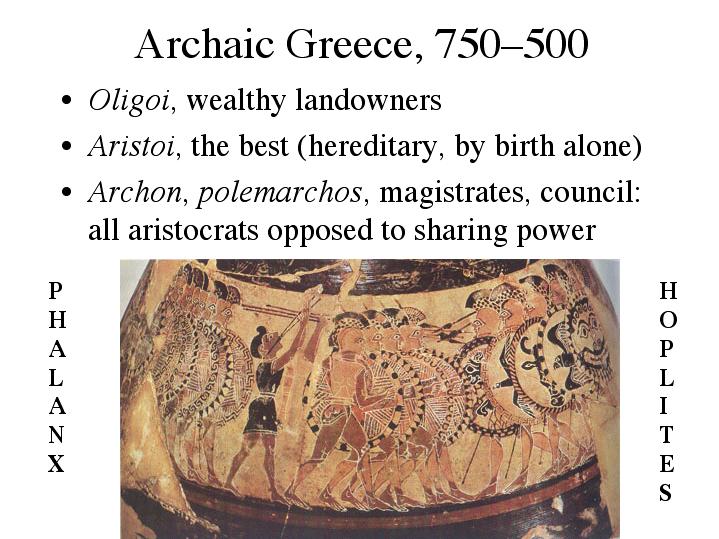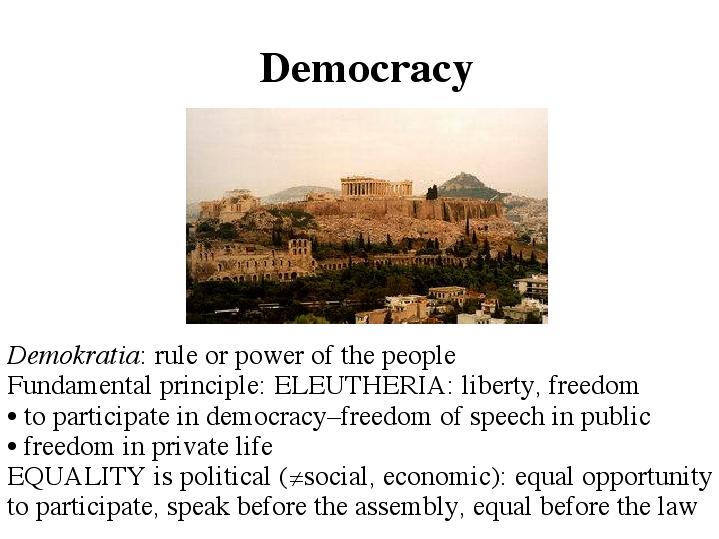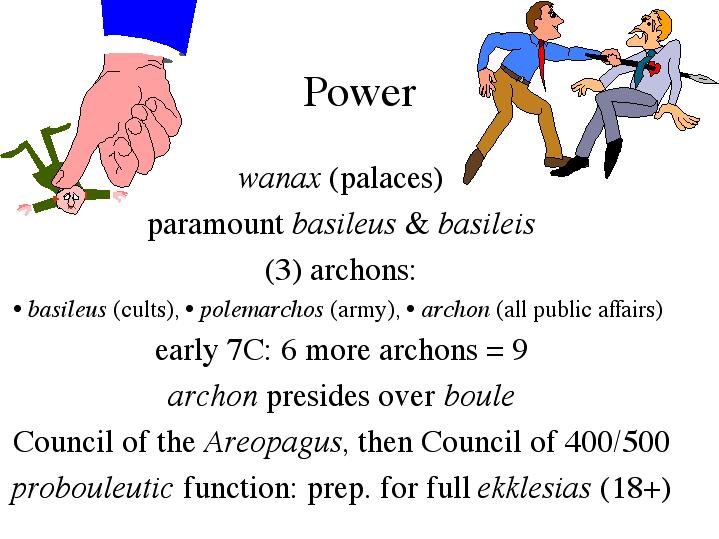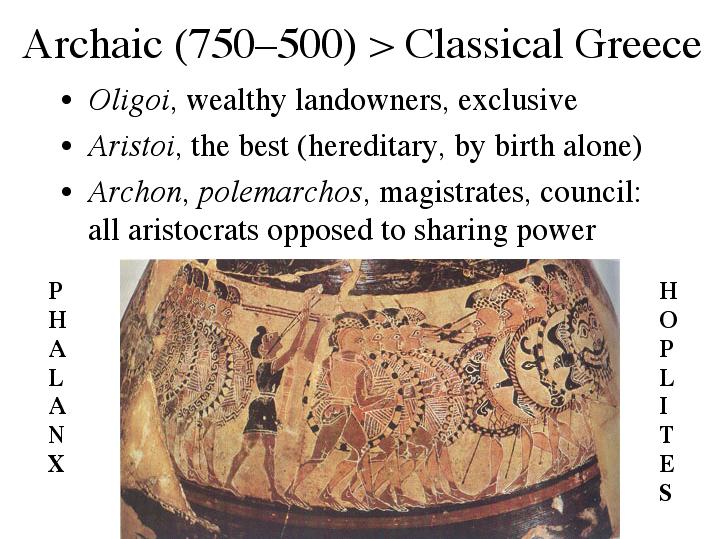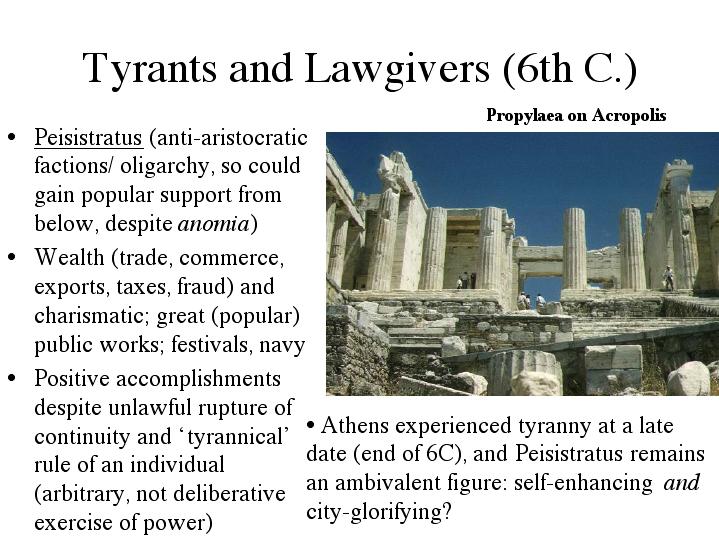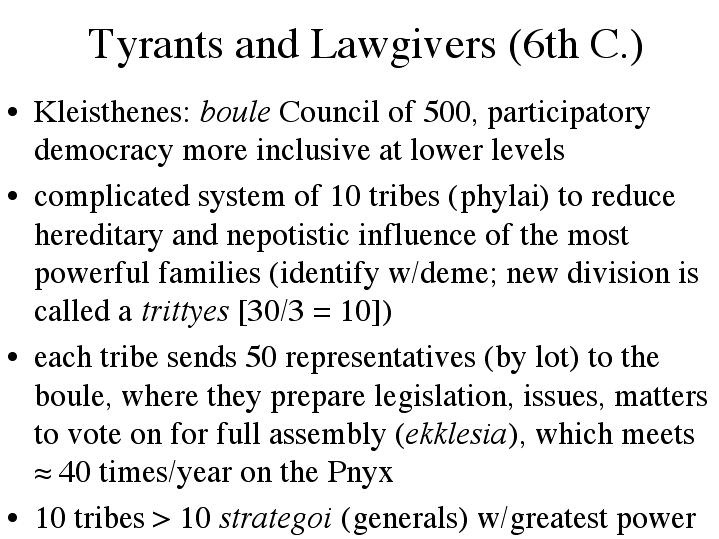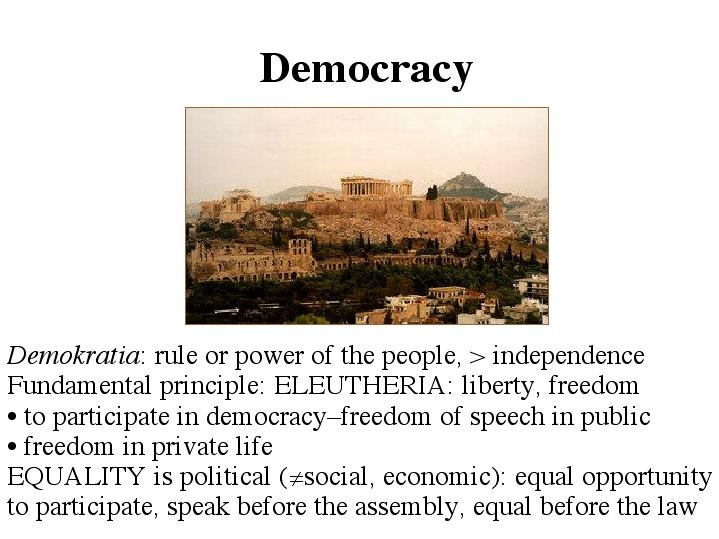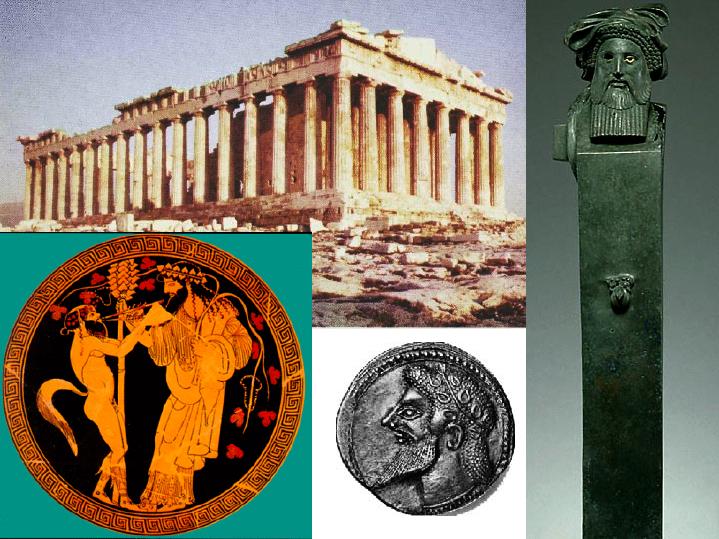
Faculty: This course will be co-taught
by Richard Fisher (Dept. of Foreign Languages), Janet McCracken (Philosophy),
Ann Roberts (Art), Lou Lombardi (Philosophy), and Ahmad Sadri (Sociology
and Anthropology), and Heather Tanner (History). Richard Fisher is
the primary professor, responsible for grading.
Description: Our objective is to help you gain a greater understanding of the ancient Greek world, in which so many of our own humanistic values and ideas found their earliest expression. We especially want you to know some of the story as it is presented by the ancient Greeks themselves--in their literature, written history, philosophy, art, and artifacts. The course is interdisciplinary by design, both in WHAT is studied and HOW it is studied.
Texts for Gk Civ 201:
ANCIENT: Homer,
The
Odyssey
Herodotus, The Histories (W.W. Norton, abridged
text with commentaries)
Aeschylus, The Oresteia
Thucydides, On Justice, Power, and Human Nature
Plato, The Trial and Death of Socrates
MODERN:
Pomeroy, Burstein, Donlan, Roberts, Ancient Greece (AG)
Pedley, Greek Art and Archaeology (Art)
Bruit Zaidman & Schmitt Pantel, Religion in the
Ancient Greek City (Rel)
David Turner, Byzantine Age (Byz) (This text
will be purchased in class)
Other materials will be available from the Program in
Greece and Turkey Web page:
http://www.lfc.edu/academics/greece/
Texts and Materials for On-Site Courses, also used
in Gk Civ 201:
Pedley, Greek Art and Archaeology (Gk Civ 202, 203)
Bruit Zaidman & Schmitt Pantel, Religion in the Ancient
Greek City (Have a copy to share in Gk Civ 203)
David Turner, Byzantine Age (Gk Civ 204)
Program Timelines (photocopies) (all)
Cylcadic Culture (photocopies) (Gk Civ 202)
Minoan Culture (photocopies) (Gk Civ 202)
Mycenaean Culture (photocopies) (Gk Civ 202)
Social History: Dark Age, Colonizing Period, Archaic Age (photocopies)
(Gk Civ 203)
Historical Background: The Decline of Classical Greece to the
Dawn of the Byzantine Empire (Gk Civ 204)
Requirements:
(1) The class is not large, and we shall expect everyone to participate
in discussion. The reading is sizable in quantity, often challenging
in difficulty. Students are expected to complete the readings before
the class session for which they are listed; keep up to date with your
reading so you can discuss it intelligently!
(2) Through weekly brief quizzes, we shall encourage you to fashion
a basic framework of information from materials provided in your
readings and highlighted during the class sessions. This weekly test
will have three parts: (1) identification of key terms and myths, (2) chronology,
(3) essay responses to questions about the readings and lectures.
(3) Because of the substantial amount of reading, there will
be only a modest--8 to 10 pp--outside research project. Topics and guidelines
will be provided.
(4) For the three-hour final examination, you will be provided
with the questions in advance. The examination will consist of essays
which analyze, compare, and integrate course materials from the lectures,
discussions, and readings. This is not a typical final exam; it encourages
you not only to report on what was covered in the prerequisite course
but also to assimilate a wide variety of material in anticipation of the
on-site visits in the next courses. It is both backward and forward
looking.
Grading: Course grades will be based on the following: (1) class participation--15%, (2) weekly tests--25%, (3) research paper--30%, and (4) final examination--30%. In discussion, papers and the final exam, weight will be given to relevant and searching questions, critical comments, and--notably in your writing--clarity, organization, and argumentation.
Extra Sessions: In addition to regular class time, a number of special
class sessions will be scheduled: extra modern Greek language sessions,
a meeting to discuss possible paper topics, sessions to share information
learned writing research papers, a Saturday morning trip to the Art Institute
Greek art collection, and a group dinner.
Date Topics Assigned Readings
Tu 1/16 The Aegean world: geography, climate, historical
timeline (Fisher)
Bronze Age Greece (Lombardi)
THE BRONZE AGE
We 17 Bronze Age Greece, cont. (Lombardi)
AG I; Timeline 2
The Iliad (Fisher) Iliad
(xerox)
Th 18 Minoan and Mycenean architecture (Roberts)
Quick Tours of Knossos &
Mycenae (Program
web page)
Minoan and Mycenaean art (Roberts) Timelines
3, 4; Minoan Culture, Mycenaean Culture (xeroxes)
Fr 19 The Odyssey (Sadri) Odyssey 1-4
Mo 22 Odyssey (Fisher) Odyssey, 5-8
Tu 23 The Odyssey (McCracken)
Odyssey 9-16
The Odyssey (Lombardi) Odyssey
17-24
We 24 Review and Quiz
Language and Culture Session
Th 25 Transition: Dark Age and Colonizing Period (Fisher)
AG III (pp 82-109);
ý Social History,
Secs I-V (xerox)
CLASSICAL THROUGH HELLENISTIC AGES
Fr 26 Common Culture: Greek Religion (McCracken) BZ, Chs 1,2,4,5
Mo 29 Common Culture: Greek Religion (Fisher) BZ, Chs 6-9, 12-15
Tu 30 Sparta (Lombardi) AG,
IV, Timeline 8
Early Athens (Fisher) AG, V (pp.,
159-178)
We 31 Herodotus (Fisher) AG, V (pp. 178-200);
Timeline 7
Herodotus (Tanner) Histories, pp.
3-73, 148-54
Th 2/1 Review and Quiz
Language and Culture Session
Fr 2 Herodotus (Fisher) Histories, pp. 155-237
Mo 5 Tours of Acropolis and Delphi (Lombardi)
Quick Tours of Acropolis &
Delphi (Program
web page)
Tu 6 Greek Sanctuaries (Fisher)
BZ, Chs. 10,11
Greek Temple Architecture (Roberts) Pedley,
pp. 149-160; 240-261
We 7 Review and Quiz
Language and Culture Session
Th 8 Greek Arts and Theater (Fisher)
AG VI (pp. 219-233)
Aeschylus' "Oresteia," play 1 (Fisher)
Aeschylus, Agamemnon
Fr 9 Sociology of Greek intellectuals (Sadri)
*
Sa 10 MORNING FIELD TRIP TO ART INSTITUTE (weather permitting)
Mo 12 Aeschylus' "Oresteia," the second play (Sadri) Aeschylus, Libation Bearers
Tu 13 Classical sculpture, pottery (Roberts)
Pedley: Sculp, pp. 115-119, 125-
131, 183-191,
193-199; Pottery:
pp. 138-145,
168-183, 217-230
Greek family, Society, Economy (McCracken) AG VI
(pp. 233-245; 201-219)
We 14 AeschylusÝ ýOresteia,ţ the third play (McCracken) Aeschylus,
The Eumenides
Background to Peloponnesian War (Tanner) AG VII (pp.
246-255), VIII (pp.
287-328)
Th 15 Review and Quiz
Language and Culture Session
Fr 16 Peloponnesian War, early years (Fisher) Thucydides,
pp. 1-37
Timeline 9
Mo 19 Peloponnesian War, middle years (Tanner) Thucydides, pp. 39-109
Tu 20 Peloponnesian War, middle years (Tanner) Thucydides,
pp. 111-160
Peloponnesian War, final years (Fisher)
ý
We 21 Review and Quiz
Language and Culture Session
Th 22 Classical Age, overview (Fisher)
AG IX (pp. 331-353)
Greek Philosophy: Presocratics (McCracken) AG III
(pp. 121-24); VII (267-74)
Fr 23 Development of Greek philosophy (McCracken) Plato, Trial and Death of Socrates
Su 25 GROUP DINNER (Date Tentative)
Mo 26 Philip (Fisher) AG X
Tu 27 Further on Greek philosophy (McCracken)
AG IX (pp. 353-68)
Hellenistic Art (Roberts) Pedley,
pp. 316-19; 325-28; 330-54
We 28 Alexander (Fisher) AG XI
Language and Culture Session
Th 3/1 Review and Quiz
Hellenistic Age (Fisher) AG XII;
Timeline 10
BYZANTINE ERA
Fri 2 Byzantine History (Tanner) Historical
Background (xerox)
[Student papers due before 5:00 PM] Turner,
East Roman History,
I (Skim)
Mo 5 Art of the Byzantine Era (Roberts) Turner,
Orthodox Christianity,
Byzantine Art, Byz. Church
Architecture (Skim)
Tu 6 Greece and Islam (Sadri)
Language and Culture Session
We 7 Final Exam: 8:00-11:00
| A Alpha, a alfa
agathos
B Beta, b bhta (vee) barbaros
G Gamma, g gamma gaia
D Delta, d delta (th) daimon
E Epsilon, e eyilon ego
Z Zeta, z zeta zdao
H Eta, h hta hedone
Q Theta, q qeta thalatta
I Iota, i iwta |
A Alpha, a alfa
good, noble, brave
B Beta, b bhta (vee) foreign
G Gamma, g gamma earth
D Delta, d delta (th) divinity, fate, being
E Epsilon, e eyilon I (the pronoun)
Z Zeta, z zeta to live
H Eta, h hta pleasure, happiness
Q Theta, q qeta sea
I Iota, i iwta |
iatros
hieros
ta hiera
hippos
historia
K Kappa, k kappa
kairos
kakos
kalokagathia
kalos
kardia
kephale
kleos
kosmos
krisis
krites
kybernetes
kunos
L Lambda, l lambda
Lakedaimonios
lamp(=b)ros
leon
lithos
logismos
logos
lupe
M Mu, m mu
mathema
Macedon
Marathon
mache
megas, mega
Menelaos
meter
mikros
moira
Mousa
mousike
iatroV
ieroV
ta iera
ippoV
istoria
kairoV
kakoV
kalokagaqia
kaloV
kardia
kefalh
kleoV
kosmoV
krisiV
krithV
kubernhthV
kunoV
LakedaimonioV
lamproV
lewn
liqoV
logismoV
logoV
luph
maqhma
Makedwn
Maraqwn
mach
megaV, mega
MenelaoV
mhthr
mikroV
moipa
Mousa
mousikh
physician
holy, sacred
(the) temples
horse
history, investigation
perfect moment, critical time
bad, evil, cowardly
beauty+goodness
good, beautiful, noble
heart
head
fame, renown, report
order, universe, world
judgment, decision, trial
judge
pilot
dog (bitch)
Spartans
bright
lion
stone
reasoning
word, speech, account
pain, grief
knowledge
Macedonian
Marathon
battle
great, large
Menelaus
mother
small
fate, destiny
Muse
any art, esp. music
N Nu, n nu
naus
neos
nike
noeo
noema
nomothetes
nomos
nostos
nous, noos
nux, nuktos
X Xi, x xi
xenos
O Omicron, o omicron
odos
odontos
oikos
holos
Olympia ta
Olympionikes
Homeros
homologeo
homonoeo
onoma
orge
orthos
ornithos
oudeis
ouranos
ophthalmos
opsis
P ?i, p pi
pathos
paideia
paidos
paradeisos
paradoxos
pater
patris
Peiraieus
Peloponnesos
Perikles
nauV
neoV
nikh
noew
nohma
nomoqethV
nomoV
nostoV
nouV / nooV
nux / nuktoV
xenoV
odoV
odontoV
oikoV
oloV
Olumpia ta
OlumpionikhV
OmhpoV
omologew
omonoew
onoma
orgh
orqvV
orniqoV
oudeiV
ouranoV
ofqalmoV
oyiV
paqoV
paideia
paidoV
paradeisoV
paradoxoV
pathr
patriV
PeiraieuV
PeloponnhsoV
PeriklhV
ship
new, young
victory
think
thought
lawgiver
law, custom
return, homecoming
mind, intelligence
night
stranger, friend, guest
way, road, journey
tooth
house(hold)
whole
Olympic games
Olympic victor
Homer
agree, admit
agree, think with
name
anger, temperament
correctly
bird
no one, nothing
heaven
eye
sight, seeing, face
experience, suffering
education
child, boy, slave
park
contrary to expectation
father
native land, country
Piraeus
Peloponnesus
Pericles
P ?i, p pi
peripatos
plastos
Platon
ploion
ploutos
pneuma
poieo
poietes
polemos
polis
politeia
polites
(zdoön) politikon
Poseidon
potamos
praxis
Prometheus
pros theon
protos
R Rho, r rw
rhathumos
rheo
Rhodos
S Sigma, s sigma
selene
skene
Solon
Sophokles
sophos
Spartiates
sperma
strategos
synapto (synapso)
Sphingx
Sokrates
soma
T Tau, t tau
tauros
telos
terpsis
trigonon
peripatoV
plastvV
Platwn
ploion
ploutoV
pneuma
poiew
poihthV
polemoV
poliV
politeia
polithV
(zvon) politikon
Poseidon
potamoV
praxiV
PromhqeuV
proV qevn
prvtoV
raqumwV
rew
RodoV
selhnh
skhnh
Solwn
SofoklhV
sofoV
SpartiathV
sperma
strathgoV
sunaptw (sunayw)
Sfigx
SwkrathV
svma
tauroV
teloV
teryiV
trigonon
a walking around, stroll
falsely, artificially
Plato
boat
wealth
breath, inspiration
do, make, meet
poet
war
polis, city
government
citizen
political animal
Poseidon
river
doing, affair, work
Prometheus
by, in name of the gods
first
easily, lightheartedly
flow
Rhodes
moon
tent, stage, stage building
Solon
Sophocles
wise, prudent
Spartan
seed
general
fasten together, attach
Sphinx
Socrates
body, person
bull
end, purpose
enjoyment
triangle
T Tau, t tau
tropaion
tropos
Troes
tyrannos
tyche
U Upsilon, u upsilon
(i yilon)
hybris
hygieia
hydor
hyper
hypnos
F Phi, f fi
pharmakon
phero
pheugo
phileo
philos
philosopheo
phobos
phren / phrenos
phylax
physis
phone
phos
C Chi, c ci
charis
cheiros
chronos
Y Psi, y yi
pseudos
psyche
W Omega, w wmega
hora
tropaion
tropoV
TrveV
turannoV
tuch
ubriV
ugieia
udwr
uper
upnoV
farmakon
ferw
feugw
filew
filoV
filosofew
foboV
frhn / frenoV
fulax
fusiV
fwnh
fvV
cariV
ceiroV
cronoV
yeudoV
yuxh
wpa
trophy, victory
character, manner, turn
Trojans
ruler, tyrant
fate, luck
overbearing pride, insolence
health
water
over
sleep
drug, medicine
carry, bear, transport
flee
love, greet, welcome
friend
love wisdom, seek knowledge
fear
mind, understanding
guard
nature
sound, voice
light
favor, grace, thanks
hand
time
false
soul
season, hour, time
Kali Orexi
good appetite
bon appetit!
h pitsa kai h KOKA KOLA
polh fagwsmoV!
menin aide qea Peleiadiou Acilleiou/ ouloumenon
the wrath sing, goddess, of the son of Peleus (of) Achilleus/ the baneful
Alphabet
A Alpha, a alfa
B Beta, b bhta (vee)
G Gamma, g gamma (ng)
D Delta, d delta (th)
E Epsilon, e eyilon
Z Zeta, z zeta (zed)
H Eta, h hta
Q Theta, q qeta
I Iota, i iwta
K Kappa, k kappa
L Lambda, l lambda
M Mu, m mu
N Nu, n nu
X Xi, x xi
O Omicron, o omicron
P Pi, p pi
R Rho, r rw
S Sigma, s sigma (V at end)
T Tau, t tau (taf)
U Upsilon, u upsilon
F Phi, f fi
C Chi, c ci
Y Psi, y yi
W Omega, w wmega
ai = aisle; au = house
ei = feign; eu = met+moon
Ancient
aha, archon
biology
graph, grape
democracy
epigram
glazed (zd), adze (dz)
fête, paper
theater
geranium, police
kinetic
labyrinth
metaphor
nanny
axiom
optics, polemic
perimeter
romance, rhinoceros
sorry, semantic
tactics, tooth
tu (Fr), üben (Ger)
Philip, flotsam
(* k/chorus) machen
eclipse, pssst!
ode, ocean, orgy
hu = fête+moon; oi = foil
ou = moon; ui = we
Modern
another
variety, vita
gather (> a,o,ou), yes (> e,i)
there, then
help, Helen, get
Zorro, zealous, zoom
these, yum, ski
thin, thud, thunk
these, ease, yo, bit
cake, Coke, cocky
law, love, lousy
mom, mustard
note, nuke, nudnik
xenophobia (* z/xerox)
oppose, opportunity
parish, pope, popsicle
run, rage, rumble
start, star, stair
tom, tomorrow, top
they, eye, eeeks!, ski
first, flirt, frog
J.S. Bach, yeech!, loch
copse, corpse, Pepsi, lips
operation, hot
ei, oi = these; ai = Helen
ou = moon;
au = have, afternoon
eu = every, effigy
Ariqmos, ariqmoi
0 mhden
1 ena
2 duo
3 treiV, tria
4 tessereiV (ra)
5 pente
6 exi
7 efta
8 octw
9 ennea
10 deka
11 enteka
12 dwdeka
13 dekatria
14 dekatessera
15 dekapente
16 dekaexi
17 dekaefta
18 dekaoctw
19 dekaennia
20 eikosi
21 eikosi eva
22 eikosi duo
23 eikosi tria
24 eikosi tessera
25 eikosi pente
26 eikosi exi
27 eikosi efta
28 eikosi octw
29 eikosi ennia
30 trianta
40 saranta
50 penhnta
60 exhnta
70 ebdomhnta
80 ogdonta
90 enenhta
100 ekato
200 diakosia
300 triakosia
400 tetrakosia
500 pentakosia
600 exakosia
700 eftakosia
800 octakosia
900 enniakosia
1000 cilia
2000 duo ciliadeV
3000 treiV ciliadeV
4000 tessereiV ciliadeV
5000 pente ciliadeV
6000 exi ciliadeV
1000000
ena ekatommurio
mee-deign
n-ah
thee-oh
tree-ah
teh-sera
pen-deh
eck-see
eff-tah
awk-toh, och-toh
eh-nay-ah
thecka
en-thecka
tho-thecka
thecka-tree-ah
thecka-the-sera
thecka-pen-deh
thecka-eck-see
thecka-eff-tah
thecka-awk-toh
thecka-eh-nay-ah
ee-koh-see
ee-koh-see n-ah
ee-koh-see thee-oh
ee-koh-see tree-ah
ee-koh-see teh-sera
ee-koh-see pen-deh
ee-koh-see eck-see
ee-koh-see eff-tah
ee-koh-see awk-toh
ee-koh-see eh-nay-ah
tree-ahn-da
sar-ahn-da
peh-neen-da
eck-seen-da
ev-doh-meen-da
awk-doan-da
enen-een-da
eh-ka-toh (> hecatombes)
thee-ah ko-see-a
tray (tree-ah) ko-see-a
tetra ko-see-a
penda ko-see-a
eck-sa ko-see-a
eff-tah ko-see-a
awk-tah ko-see-a
eh-nay-ah ko-see-a
hee-lee-ah
thee-oh hee-lee-ah-thess
tree-ah hee-lee-ah-thess
teh-sera hee-lee-ah-thess
pen-deh hee-lee-ah-thess
eck-see hee-lee-ah-thess
n-ah eh-kah-ton meer-ee-oh
Basic
Yasas!
Yasou!
Te kanete?
Te kanes?
Kala, ephkaristo (efharisto)
Kali (kahlee) mera
chairete (hair-ay-tay)
Kali spera
Kali nichta
kali orexi
kalo taxithi
nay
ochi (oh-hee)
ephkaristo (efharisto)
parakalo
psignomi (seegnomee)
oriste (oreesteh)
kalos orises (oreesess)
kalos orisete (oreeseteh)
psomi (psomee)
psari (psaree)
nero (neh-row)
Hello! (formal, plural)
Hello! (informal, singular)
How are you? (formal, plural)
How are you? (informal, singular)
Fine, thanks
good morning
good day, good afternoon
good evening
good night
bon appetit!
bon voyage!
yes (slight shake of the head)
no (nod head upwards)
thanks, thank you
please, youÝre welcome, excuse
excuse me, sorry
here it is, here you are
welcome! (formal, plural)
welcome! (informal, singular)
bread
fish
water
Basic
Yasas!
Yasou!
Te kanete?
Te kanes?
Kala, ephkaristo (efharisto)
Kali (kahlee) mera
chairete (hair-ay-tay)
Kali spera
Kali nichta
kali orexi
kalo taxithi
nay
ochi (oh-hee)
ephkaristo (efharisto)
parakalo
psignomi (seegnomee)
oriste (oreesteh)
kalos orises (oreesess)
kalos orisete (oreeseteh)
psomi (psomee)
psari (psaree)
nero (neh-row)
kalos kaloV
kakos kakoV
mikros mikroV
megalos megaloV
ligos ligoV
polis poluV
oreos wraioV
ti ora ineh? ti wra einai
ineh thio i ora einai duo h wra
neh, parakalo nai parakalw
ochi, efkharisto oci eucaristw
signomi suggnwmh
endaxi entaxei
ya, ya-su, ya-sas, ya-mas geia
poso kani poso kanei
milateh Anglika milate Agglika
milaoh Anglika, Ellenika milaw
tha eethela, thelo qa hqela, qelw
kiri-eh kurie
kiri-ah kuria
kafes (metrios) kafeV metrioV
tschai tsai
krasi: aspro krasi/kokino krasi
bira mpura
portokalatha portokalada
sas efkharisto ya ti filoxenia sas
Hello! (formal, plural)
Hello! (informal, singular)
How are you? (formal, plural)
How are you? (informal, singular)
Fine, thanks
good morning
good day, good afternoon
good evening
good night
bon appetit!
bon voyage!
yes (slight shake of the head)
no (nod head upwards)
thanks, thank you
please, youÝre welcome, excuse
excuse me, sorry
here it is, here you are, pardon; what?
welcome! (formal, plural)
welcome! (informal, singular)
bread
fish
water
good
bad
small
big
few, little
lots, much, very
nice, pretty, beautiful
what time is it?
it is two oÝclock
yes, please
no, thanks
excuse me; please
ok
hi, hello, cheers (to you), cheers (to us)
how much?
do you speak English?
I speak English, Greek
I would like (I want)
mister, sir
mrs., maÝam
coffee
tea
wine, white wine, red wine
beer
orange juice
thanks for your hospitality
Student Contacts:
´ tony andros x5677 box 120
´ danielle Sorensen x5551 box 1263
´ kristi keesey x5897 box 729
´ angie woodard x5897 box 1354
´ michael sellig x5716 box 1064
´ grayson flitcroft 623-1228 box 1421
´ jordon johnson x5646 box 660
´ lindsay bigelow x5984 box 173
´ sandra fisler x5362 box 458
faculty contacts:
´ ann roberts x 5188
´ janet mccracken x 5024
´ lou lombardi x 5187
´ ahmad sadri x 5251
´ dean speros x 5021
´ richard fisher x 5284
library/research assistance
´ cory stevens x 5072
computer assistance
´ diane snedden x 5113
(the college e-mail server is named ŰhermesÝ thanks to valerie archambeau)
Lake Forest College
Program in Greece and Turkey
2001
Books to Bring to Greece
Be sure to bring along:
Pedley-greek art and archaeology
BZ-religion in the ancient greek city
Handouts relevant to 202,203 // timelines
David TurnerÝs book: 204, Byzantine
´ you can share your books
´ Sandra has the phrase book/tapes: sheÝll share!!
Books: ta biblia
Recent titles in CLASSICS that illustrate 1) a range of contemporary interests, 2) classical studies are alive and well (they are so rich & interdisciplinary)
k. morgan, myth and philosophy from the presocratics to plato
r. brilliant, my laocoon
m.s. silk, aristophanes and the definition of comedy
j. macgillivray, minotaur: evans and the archaeology of myth
l.a. tritle, from melos to my lai
raaflaub, rosenstein, war and society in ancient/med. world
f. russell, information gathering in classical greece
y.l. too, the pedagogical contract: sites of teaching+learning
j.s. morrision, the athenian trireme (2nd edition!)
sissa, detienne, the daily life of the greek gods
j. cropsey, platoÝs world: manÝs place in the cosmos
c. zuckert, postmodern platos
f. zeitlin, playing the other: gender+society in class. greek lit.
louden, schollmeier, the greeks and us
p. veyne, did the greeks believe in their myths?
9 February 2001
Hi Students,
´ please recall the Art Institute excursion on Saturday, 17 Feb. Details
follow.
´ please check off whether you wish the Hotel Dioskouros reservation
(2 days, or you stipulate length), and when you will arrive in Athens.
´ our next dinner and film: a Thursday seems best for most, but a Friday
has not been ruled out. Please check below: ephkaristo!
HOTEL DIOSKOUROS, ATHENS Yes No
onoma: ________________________________
DATE OF ARRIVAL: ____________________
---------------------
FILM: THURSDAY OK FRIDAY OK
February 12, 2001
Hi Lindsay,
2 suggestions for your topic on Dionysus, both very ambitious:
?you might tackle NietzscheÝs Birth of Tragedy from the Spirit of Music;
?Charles Segal, Dionysiac Poetics and EuripidesÝ Bacchae
Please let me know if these are of interest, and please remember that this is not to be a fully innovative and scholarly research paper.
Good luck, Richard Fisher
February 12, 2001
Hi Grayson,
A modest suggestion if you follow your interest in the Sophists: introduce the group in a general and contextual fashion, but then narrow down to a specific dimension of these mensÝ thought, teaching and other activity. You might focus on such issues as:
?the role of Rhetoric (or even demagoguery) in ancient Athens;
?specific sophists, such as Protagoras or Gorgias, whom we know largely
through Plato and SocratesÝ unflattering picture;
?the role of Sophists in Greek education
This last point is a topic with much to commend it: you could discover the system of education in ancient Greece, to which the Sophists made a very significant contribution, and their role is related to other aspects of Greek (esp. Athenian) society, politics, philosophy, morality, education and the practices and tenor of life.
Good luck, Richard Fisher
February 25, 2001
Hi Angie,
here are the groundbreaking, standard texts on homosexuality I recommended:
K.J. Dover, Greek Homosexuality
D.M. Halperin, One Hundred years of Homosexuality
J.J. Winkler, The Constraints of Desire: The Anthropology of Sex and Gender in Ancient Greece
you might also try to get hold of T.W. Africa, ýHomosexuals in Greek History,ţ which is in Journal of Psychohistory 9 (1982), around p. 400 [and itÝs = 20 pp. long)
please remember: ask Cory Stevens in Reference/LibraryˇsheÝs a great resource!!
onoma e-mail currently used
´ tony andros tandros37@hotmail.com
´ lindsay bigelow bigellr@hotmail.com
´ sandra fisler sacha2000@hotmail.com
´ grayson flitcroft gflitcroft@wnpl.alibrary.com
´ jordon johnson drumrmon7@aol.com
´ kristi keesey cerridwen3@hotmail.com
´ michael sellig mslig8@aol.com
´ danielle Sorensen dznyfan_2@hotmail.com
´ angie woodard angiew24@hotmail.com
ART INSTITUTE: T, FEB. 20, 10:30 A.M.
USE EAST ENTRANCE, COLUMBUS DRIVE
WEÝLL STAY TOGETHER = 1.5 HOURS, SO APPROX. NOON
how to get there:
downtown lf station 8:25
take train to evanston, davis street station, arr. 8:54
across the streetˇpurple line ýlţ train, evanston express
take to downtown chicago, adams and wabash
walk east 1 short block + 1 long block to columbus drive
turn L, or N, to corner of columbus and monroe:
e entrance of art institute
SUNDAY, FEB. 25, DINNER AT LOU LOMBARDIÝS, MEET AT 5:30
PIZZA/FILM ON TH. FEB. 22, 5?7:30?
IN-CLASS PRESENTATIONS, Th 3/1
5?7 minutes per student, on paper topics
ˇplease have a hand-out for fellow students:
outline of your paper, topic and main points, points of interest
bibliographical
PAPERS DUE T, 3/6 TO DEAN MCCRACKEN IN NORTH HALL BEFORE 4:00 PM
switch language and quiz day:
Hellenism; language&culture; review and quiz, W 2/28
language&culture wrap-up, Th 3/1 [10:00 a.m. Lou Lombardi]
SUNDAY, FEB. 25, DINNER AT LOU LOMBARDIÝS, MEET AT 5:30
PIZZA/FILM ON TH. MARCH 1, 5?7:30?
SEE YOU IN ATHENS!

































